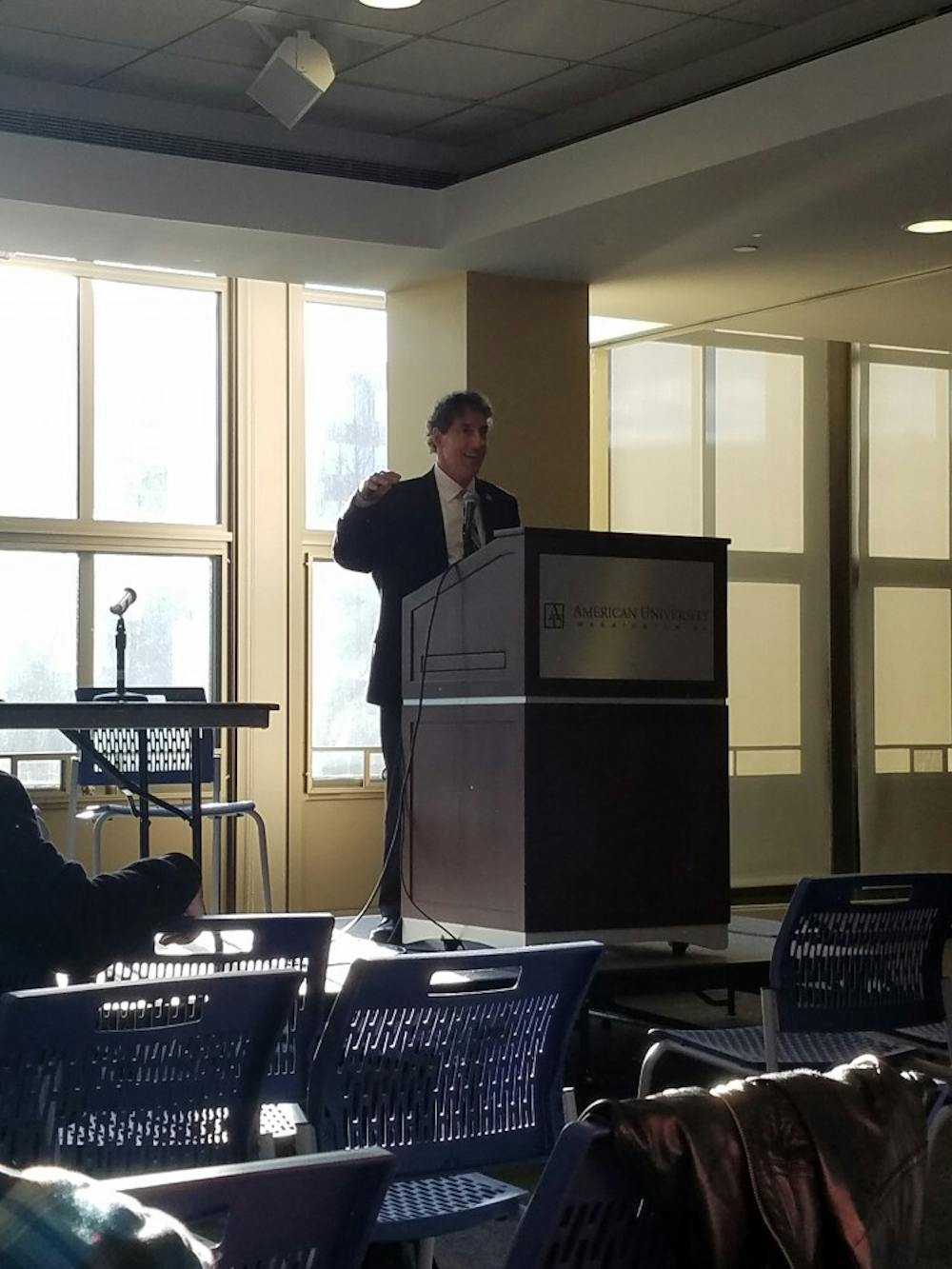Just days before the inauguration of America’s 45th president, AU students, faculty and staff gathered in the Mary Graydon Center on Wednesday for the educative forum, “Teach, Organize, Engage.” The day was full of discussions and speakers, and included keynote remarks from Rep. Jamie Raskin of Maryland on his role in Congress in the Trump administration.
The teach-in on contemporary politics began at 8:30 a.m. in MGC 3 with opening remarks from Student Government President, Devontae Torriente, and faculty allies Todd Eisenstadt, Larry Engel, Keesha Ceran, Andrea Pearson and Daniel Esser from the Faculty Senate and Staff Council, as well as University Chaplain Mark Schaefer.
Torriente said that the dehumanization of other people’s opinions and views is a phenomenon of ‘otherness’ that reinforces social hierarchies of the past. He believes that this kind of social division is no longer being tolerated by students.
“I think that a lot of the divide we are seeing [isn’t] necessarily new, but it’s also reinforced... by social networks and social media,” Torriente said. “But I don’t necessarily see social media as the reason for that… but I think whenever we talk about the ‘other’ and the other side, and not dehumanizing or demonizing them so to speak, there has to be a consideration of the historical context for a lot of those political beliefs.”
The event began with panel discussion after individual presentations focusing on the “post-truth” era and the responsibility of universities and academic institutions to uphold their values and community standards in the coming years.
“We need to get together today, but not just today, to teach, to listen to, to learn from each other because it is through engaged dialogue that we resist populist politics and instead, practice and defend democracy,” Esser, an associate professor in the School of International Service, said.
Following the introductory remarks and discussion, professor Candice Nelson of the School of Public Affairs spoke on the polarization of American politics. Derrick Jefferson from the University Library discussed the “post-truth” era of information in which knowledge that is spread online lacks credibility and accuracy.
Professor Scott Talan of the School of Communication explained the new role of social media in presidential campaigns. Jefferson and Talan both stressed the importance of evaluating sources of news online.
Talan noted that Trump’s use of social media and news to have won the presidency was “impressive,” but believes that his success using sensationalism will never be repeated because it was so unique and occurred in a vacuum of misinformation and manipulation online.
Speakers also addressed issues of immigration and border security, Muslim-American rights, current challenges to democracy, climate change, U.S. relations in Russia and China and developments in the Middle East. All of the presentations from AU faculty were focused on these issues in context of the new Trump administration.
Congressman Raskin, a former professor in the Washington College of Law who taught there for 25 years, spoke during the keynote address at 3 p.m. He enlightened the audience on his experience in his new position in Congress as a member of the minority party.
“These are extreme times we are living in my friends...” Raskin said. “We’ve gotta find places where we can work with the incoming administration wherever we can, and we gotta find the places where we can fight and resist the agenda whenever we can.”
He disclosed his personal choice to forgo the inaugural ceremony on Friday, and instead said he would focus his energies on the Women’s March on Washington. He said gun safety, the environment, health care and freedom of expression are only a few of the issues that his Democratic colleagues will be fighting for in Congress. He especially expressed concern about the repercussions of the repeal of the Affordable Care Act in Congress.
“When I think about the ambition of the program that is being presented by Trump and Republican members of Congress, I think they must not know who we are,” Raskin said. “They must not know that we are people who understand the history of the Civil Rights Movement in America and the people who identify with the women’s movement.”
The event concluded with a student panel mediated by Torriente with various leaders of diverse student groups on campus.
The students discussed a range of topics, but focused on the current lack of intersectional organizing and the need to make activism more specific to certain identities and people. The panelists discussed that through their experiences on campus in running various organizations and projects, they had witnessed first-hand some of the failures to communicate between student groups last semester, leading to social tension and unrest on campus.
Ma’at Sargeant, president of BSA, said that boosting AU curriculum to include complex information about marginalized communities is important for more campus-wide awareness about these groups and what needs to be done to improve inclusivity at AU.
“A lot of people just truly don’t understand what minorities go through in this country, and I think that it’s really important to understand it,” Sargeant said. “...It’s so important to really acknowledge the systematic disadvantages that people go through. And I think that’s never going to be learned unless we integrate that into our school systems.”





